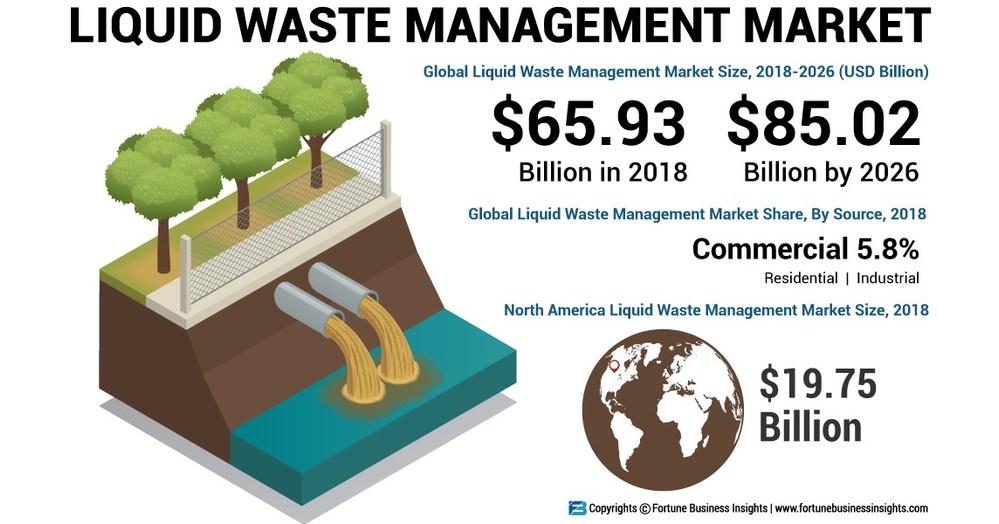The Best Guide To Reclaim Waste
The Best Guide To Reclaim Waste
Blog Article
What Does Reclaim Waste Mean?
Table of Contents4 Simple Techniques For Reclaim WasteThe Best Guide To Reclaim WasteThe smart Trick of Reclaim Waste That Nobody is Talking AboutGetting My Reclaim Waste To WorkReclaim Waste Things To Know Before You Buy
Explore the types, occurrences, and kinds of liquid waste. Residential sewage waste describes the waste and items from a domestic sewage-disposal tank. This sort of waste is created by human beings in homes, schools, and various other structures. This only includes septic tanks that have a drain area. The proper monitoring and disposal of domestic sewer waste require fluid waste to be transferred to a sewer therapy plant where the appropriate approaches and equipment are related to purify and deal with waste.
Business waste typically consists of possible hazards, such as flammable products or a mixture of liquid and solid waste items, and calls for a more sophisticated and detailed disposal process. The disposal of industrial waste commonly involves the filtration of waste before transportation to make certain secure and proper disposal. Industrial waste is produced from results and drainage of commercial procedures and manufacturing.
This kind of waste can not use the exact same sewage administration transport or procedures as septic or business fluids. The hazardous waste monitoring procedure needs the examination and screening of fluid waste prior to it undertakes the disposal procedure (liquid waste disposal melbourne). Runoff waste is the liquid waste that comes from runoff and excess stormwater in very booming locations or cities
Drainage waste can create contamination and flooding otherwise taken care of appropriately. Find out more regarding sewer cleaning and waste management. Guaranteeing proper waste monitoring can protect against calamities and minimize environmental harm. Both individuals in household setups and experts in industrial or production sectors can take advantage of comprehending the processes and regulations of fluid waste administration.
See This Report on Reclaim Waste
Contact PROS Solutions today to find out about our waste management and disposal solutions and the proper means to take care of the liquid waste you generate.
(https://profile.hatena.ne.jp/reclaimwaste1/)Do you understand what occurs to your water when you disengage, purge the bathroom or drain the washing device? No? Well, it's worth recognizing. This so-called 'wastewater' is not only an essential resource yet, after therapy, will be launched to our land, rivers or the ocean. Used water from bathrooms, showers, baths, kitchen area sinks, laundries and commercial procedures is called wastewater.

water made use of to cool equipment or tidy plant and devices). Stormwater, a form of wastewater, is overflow that flows from farming and metropolitan locations such as roofing systems, parks, yards, roads, paths and seamless gutters right into stormwater drains, after rain. Stormwater streams neglected straight to local creeks or rivers, ultimately getting to the sea.
Unknown Facts About Reclaim Waste
In Queensland, a lot of wastewater is dealt with at sewage treatment plants. Wastewater is transported from domestic or commercial websites with a system of drains and pump terminals, recognized as sewage reticulation, to a sewer therapy plant. City governments construct, keep and operate most sewage treatment plants. Operators are licensed under the Environmental Management Act 1994 to discharge cured wastewater at an appropriate ecological requirement into waterways.
The Department of Natural Resources recommends local governments about managing, operating and keeping sewage systems and treatment plants. In unsewered areas, city governments might require householders to install private or household sewage therapy systems to deal with residential wastewater from bathrooms, cooking areas, restrooms and laundries. The Department of Natural Resources authorizes the usage of home systems when they are proven to be reliable.
A lot of stormwater gets no therapy. In some new neighborhoods, therapy of some stormwater to remove litter, sand and crushed rock has actually begun using gross toxin traps. Wastewater therapy happens in four phases: Eliminates strong matter. Bigger solids, such as plastics and other objects mistakenly discharged to sewage systems, are gotten rid of when wastewater is gone through displays.
Uses small living microorganisms knows as micro-organisms to break down and eliminate continuing to be liquified wastes and fine particles. Micro-organisms and wastes are integrated in the sludge.
Reclaim Waste for Beginners
Nutrient removal is not available in all sewer treatment plants due to the fact that it requires expensive specialised devices. It is becoming a lot more typical in Queensland. Clear liquid effluent produced after treatment might still have disease-causing micro-organisms. If this effluent is launched right into waterways such as rivers or the sea, the micro-organisms will eventually die out.

This usually means wastewater has actually to be treated or contaminants gotten rid of prior to it can be discharged to rivers. A lot of wastewater flows right into the sewerage system. Under the Act, local federal governments provide approvals and permits for ecologically relevant tasks (ERAs) entailing wastewater launches that might have a neighborhood impact. The division provides authorizations and licences to ERAs entailing wastewater releases that could have a regional or statewide impact.
How Reclaim Waste can Save You Time, Stress, and Money.
Tracking provides factual details concerning water quality and can confirm that licence problems are being satisfied. The info acquired with monitoring offers the basis for making water high quality decisions.
Report this page